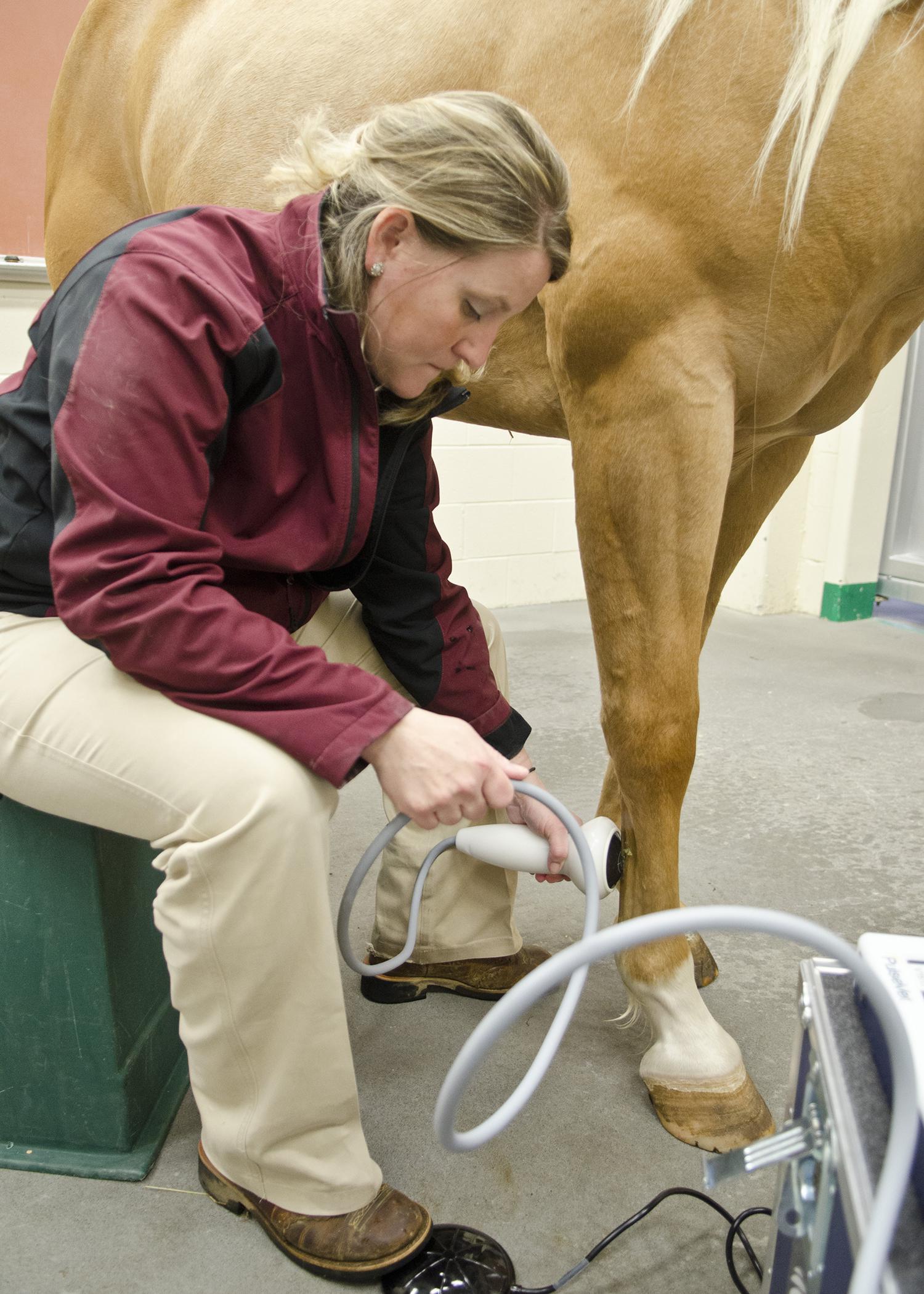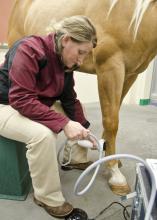Information Possibly Outdated
The information presented on this page was originally released on November 12, 2015. It may not be outdated, but please search our site for more current information. If you plan to quote or reference this information in a publication, please check with the Extension specialist or author before proceeding.
Equine athletes receive star treatment at MSU
STARKVILLE, Miss. -- Like the star athletes they are, horses have access in Mississippi to many of the same therapies humans need after exercise.
Equine veterinarians at the Mississippi State University College of Veterinary Medicine offer a variety of treatments and surgeries to mend potentially career-ending conditions.
Dr. Cathleen Mochal, assistant clinical professor, said physical soundness is critical for the usefulness of most horses. While some horses are maintained simply for their beauty and personality, most are also ridden for pleasure, work or competition.
“The equine industry is a billion-dollar industry whose sole function is the athletic soundness and performance in horses,” she said. “Athletic soundness is paramount for all our clientele, ranging from the trail-riding enthusiast, barrel racer, three-day eventer and 4-H member learning to ride, to low-environmental-impact logging horses.”
Mochal said arthroscopy is becoming a mainstay in veterinary treatment plans. Another therapy gaining popularity is IRAP (Interleukin-1 Receptor Antagonist Protein), which blocks the inflammation that damages tissues. IRAP is useful in treating joint inflammation and arthritis.
“The services we offer range from arthroscopic joint surgery to regenerative medicine -- including stem-cell therapy, IRAP and platelet-rich plasma -- to pain and inflammation management in the forms of joint injections, shock wave and specialized shoeing,” she said.
Like humans, horses suffer wear and tear on their joints as they age, often requiring surgery to keep them comfortable and active, Mochal said.
“Many times, riders find that their best horses are the older horses because they are better trained and better behaved,” she added. “However, they acquire arthritis and wear with age. Most of our patients are middle age to geriatric but belong to owners who have valued relationships with their horses and want to keep enjoying their careers.”
Mochal said arthroscopic surgery and regenerative medicine can give these horses a new lease on life.
“A good example of this is horses that receive cruciate ligament injuries in their stifle, which is similar to an ACL tear in humans,” she explained. “This injury used to be career-ending for horses. However, with surgery and IRAP therapy, many of these horses are able to return to their careers.”
Dr. Robin Fontenot, assistant clinical professor, said noninvasive shockwave treatment can stimulate healing in both new and old injuries. Offered at MSU since December 2014, this treatment is administered by introducing a focused, high-energy sound wave through tissues using a shockwave probe.
While the service is relatively new to Mississippi State’s veterinary college, Fontenot said clinicians have already used the technology to treat soft-tissue stifle injuries in conjunction with regenerative therapies as part of a multitherapy plan.
“The therapy has also been used to treat navicular syndrome, tendon and ligament injuries, and back pain in horses,” she added. “Both muscle- and spine-related back pain can be treated with the therapy.”
Dr. Andrew Mackin, interim head of the College of Veterinary Medicine Department of Clinical Sciences, said MSU has a group of enthusiastic veterinarians who are committed to helping maintain the comfort and happiness of equine patients.
“Ultimately, people have horses so they can ride and enjoy them,” he said. “The fundamental goal of our facility is to provide care and services to our patients that maintain their comfort and happiness to keep them performing successfully in their careers, whatever they may be.”
Contact: Karen Templeton, 662-325-1100





